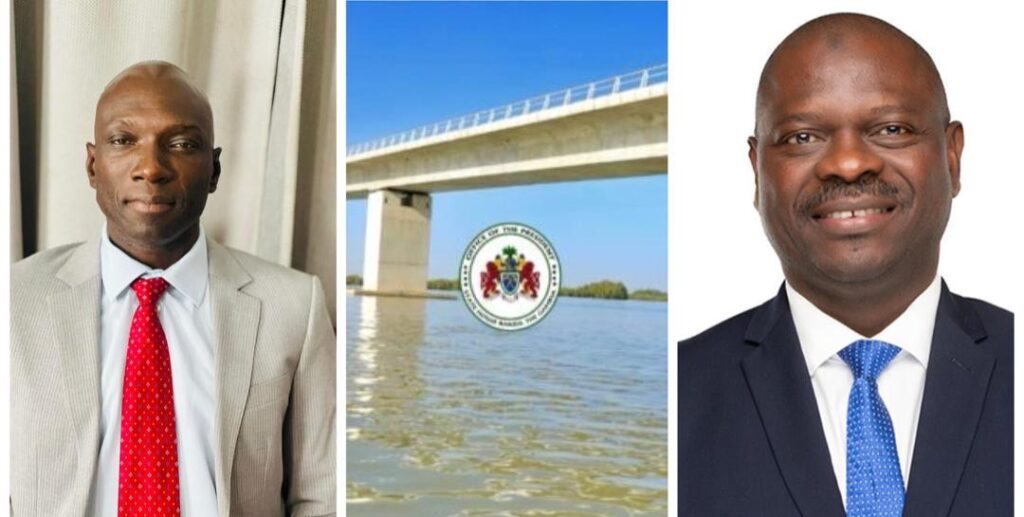The Senegambia Bridge Agreement Is A National Loss

Dr. Ousman Gajigo and Minster Seedy Keita
By Madi Jobarteh
Thanks to Dr. Ousman Gagigo, the Ministry of Finance and Economic Affairs has now uploaded the Concession Agreement on the Senegambia Bridge between the Government and Africa50. The Agreement was signed on 21st June 2024, but the Ministry never felt obliged to publicly display the document on their website at that time as required by the Access to Information Act 2021. But when Dr. Gagigo exposed some contents of the Agreement, they responded by sharing the contract. Section 7 of the Access to Information Act requires public bodies to immediately and “proactively disclose” all necessary public information in their custody such as this Agreement.
In attempting to dispute Dr. Gagigo, the Ministry attempted to explain ‘competing bridges’ which according to the Agreement, no new bridge across the River Gambia should be built within 50km radius of the Senegambia Bridge for the next 25 years but excluding the Banjul-Barra Bridge.
What the Government did not say however, which was raised by Dr. Gagigo is the issue of ‘competing route’. In the Definition and Interpretation’ section of the Agreement, a ‘competing route’ is a “new seafaring {including ferry), road excluding Competing Bridges, or rail transport infrastructure, including any mass transport scheme” whether undertaken by Government or a private enterprise. The reason is they do not want such a facility to, “adversely affects, or is likely to adversely affect, traffic volumes on the Bridge and/or the operating revenues of the Concessionaire.”
Clause 7.4 of the Agreement on the ‘Obligations relating to Competing Route’, states that neither party shall, “at any time, construct, or cause and/or permit in any way the construction of, any Competing Route, except where the volume of Vehicles on the Bridge (as set out in the Annual Traffic Volume Report) has exceeded the annual volume forecast set out in the Base Case Traffic Model by fifty per cent. (50%) or more for two consecutive Contract Years.”
By this Agreement therefore, it effectively means that nowhere along the River Gambia could the Government construct a bridge because any bridge is potentially going to affect traffic hence revenue of the Senegambia Bridge. Similarly, it means the Government cannot launch a river transport system or construct a railway simply because these routes will be real competitors against the Senegambia Bridge. How can the country wait for 25 years before it embarks on building such critical infrastructures, services and facilities for the development of the country?
After all, there is nothing special or urgent to justify subjecting Senegambia Bridge to a so-called assets recycling program. The evidence is that before the signing of this Agreement, the Senegambia Bridge was making profit according to both the Minister of Finance Seedy Keita and Minister of Works Ebrima Sillah.
For example, in March 2024, i.e., three months before the Agreement with Africa50 was signed, Minister Seedy Keita stood on the floor of the National Assembly to tell NAMs that the total revenue generated from the Senegambia Bridge between 2021 and 2023 stood at D1.09 billion. A month before the signing of the Agreement, Minster Ebrima Sillah also stated on Coffee Time with Peter Gomez that Senegambia Bridget was making 52 million dalasi per month.
From their accounts, i.e., Seedy Keita and Ebrima Sillah, the Senegambia Bridge was therefore a profitable venture which was run by the Government itself. The question now is, why should the Senegambia Bridge be mortgaged to a foreign entity for 25 years when it was not only making profit for the country but by mortgaging it the Government will now receive less revenue? According to the Agreement Africa50 will pay the Government only 100 million US dollars over 25 years. But according to Government figures, the bridge can fetch much more if run by the Government itself. Therefore, why mortgage the bridge?
It is sad that the National Assembly has failed to defend the country by not rejecting this fraudulent Agreement. They have done a huge disservice to the country, and they must correct it and be held accountable. This Agreement must be revoked so that Gambians take ownership of this vital national asset. This Agreement is irresponsible and a huge dereliction of duty which constitutes a huge economic loss to the country. Individuals who cannot secure and protect national interest should not hold public office.
For The Gambia Our Homeland

